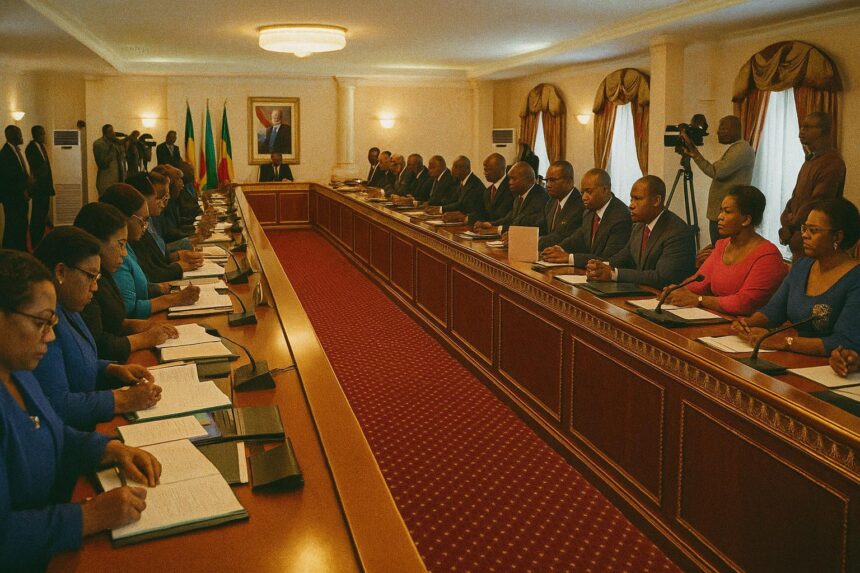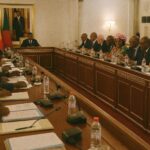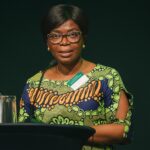A Palace Session Framing Policy Continuity
Against the marble backdrop of the Palais du Peuple, President Denis Sassou Nguesso opened the 23 July Council of Ministers with the measured assurance that has characterised his stewardship since 1997. Diplomats present describe an atmosphere of methodical resolve rather than fanfare, mirroring Brazzaville’s preference for incremental policy calibration over abrupt shifts. The agenda, publicly released within hours, ranged from climate governance to public health, signalling the administration’s determination to address multidimensional challenges without sacrificing macro-prudence.
- A Palace Session Framing Policy Continuity
- Environmental Impact Decree as Diplomatic Interface
- Postal Codification: Cornerstone for the Digital Market
- Macroeconomic Scorecard: Navigating Headwinds with Caution
- Medium-Term Fiscal Trajectory: 2026–2028 Resilience Pathway
- Aviation Audit Readiness: Securing the National Skies
- Public Health Vigilance Along Porous Frontiers
- Strategic Appointments Bolster Institutional Stability
- Policy Signals and the Regional Chessboard
Environmental Impact Decree as Diplomatic Interface
Environment Minister Arlette Soudan-Nonault obtained cabinet assent for a decree modernising environmental impact assessments, replacing the 2009 framework. The new text operationalises the 2023 Sustainable Environment Act and aligns national procedures with African Development Bank safeguards and IFC Performance Standards, thereby smoothing the path for concessional financing of energy and infrastructure projects (AfDB, 2024). By anchoring ex-ante social consultations and post-project monitoring, Brazzaville positions itself as a credible custodian of the Congo Basin, a carbon sink of strategic value to global climate diplomacy.
Postal Codification: Cornerstone for the Digital Market
Post and Digital Economy Minister Léon Juste Ibombo introduced a codification decree that segments the national territory into alphanumeric zones, a move long advocated by the Universal Postal Union. Beyond facilitating last-mile delivery, the reform is expected to lower logistics costs for e-commerce operators by up to fifteen percent, according to a 2023 UNCTAD benchmark for comparable lower-middle-income markets. The measure dovetails with Congo’s fibre-optic backbone expansion and the Central African Backbone project, reinforcing regional trade corridors under the African Continental Free Trade Area.
Macroeconomic Scorecard: Navigating Headwinds with Caution
Treasury figures presented by Finance Minister Christian Yoka reveal that by end-2024 budget revenues reached 2 323.8 billion CFA francs, or ninety-percent of target, despite a softening oil curve. Tax receipts slightly out-performed projections, helped by digitalised collection, while non-petroleum revenues suffered from tepid global demand. Expenditure growth of 9.1 percent pushed the overall deficit to 14.7 billion CFA francs, a slippage judged manageable by regional surveillance authorities of the CEMAC zone. Debt-service pressures were elevated, yet the ministry underscored that external arrears declined for a fourth consecutive quarter, echoing the IMF’s March 2025 Article IV communiqué that praised Congo’s ‘measured fiscal consolidation’ (IMF, 2025).
Medium-Term Fiscal Trajectory: 2026–2028 Resilience Pathway
The cabinet endorsed the Medium-Term Budgetary Framework projecting average real growth of 3.1 percent and headline inflation around the CEMAC threshold of three percent. The plan envisages a gradual lift of capital spending towards sectors with multiplier effects—agro-industry, logistics and renewable energy—while keeping the primary balance in surplus. Oil output is conservatively priced at 61–64 USD per barrel, reflecting EIA forecasts, and volumetric gains from the Marine XII field are expected to counterbalance mature-field declines. Domestic revenue mobilisation is to improve through the rollout of electronic invoicing and rationalised exemptions, potentially adding 0.8 percentage point of GDP annually. Analysts at Fitch Solutions view the target of reducing the debt-to-GDP ratio to eighty-percent by 2028 as ‘ambitious yet achievable’, contingent on disciplined expenditure control.
Aviation Audit Readiness: Securing the National Skies
Transport Minister Ingrid Olga Ghislaine Ebouka-Babackas briefed peers on preparations for the October 2025 ICAO safety audit. The government has already channelled resources into upgrading instrument landing systems at Maya-Maya and Pointe-Noire airports, while adopting new civil aviation regulations harmonised with the Banjul Accord Group Mechanism. Success would elevate Congo’s Effective Implementation score, currently at sixty-three percent, closer to the global average of seventy-one percent, thereby enhancing airline insurance profiles and investor perceptions in the burgeoning aviation cluster.
Public Health Vigilance Along Porous Frontiers
Health Minister Jean Rosaire Ibara alerted the cabinet to eighty-five diarrhoeal cases on Île Mbamou and over one hundred in Mossaka-Loukoléla, a reminder of epidemiological spill-overs from neighbouring states grappling with cholera spikes. In coordination with the World Health Organization, the ministry dispatched diagnostic kits and pre-positioned oral rehydration salts. The Council allocated 248 million CFA francs for rapid response, complementing the Integrated Disease Surveillance and Response strategy financed by the World Bank’s REDISSE programme. Early containment, officials argue, will safeguard labour productivity and sustain the government’s human-capital agenda.
Strategic Appointments Bolster Institutional Stability
The session concluded with appointments in the media and tourism portfolios, most notably Nestor Oyoukou at the helm of the National Printing Press and Antoinette Ashley Nguesso Ambendet as chair of the Tourism Promotion Office. These designations aim to entwine professional expertise with the state’s communication and soft-power strategies, ensuring policy coherence as Congo readies to host cultural and investment forums slated for 2026.
Policy Signals and the Regional Chessboard
Viewed collectively, the measures adopted on 23 July suggest a government intent on synchronising domestic reforms with continental agendas, from the African Union’s Agenda 2063 to the Single African Air Transport Market. International partners will note that Brazzaville is neither over-promising nor under-delivering; instead it is quietly weaving fiscal discipline, environmental stewardship and infrastructural modernity into a coherent narrative of stability. For the diplomatic corps, the takeaway is clear: while global volatility endures, Congo-Brazzaville is determined to craft its own resilience, one cabinet deliberation at a time.





















